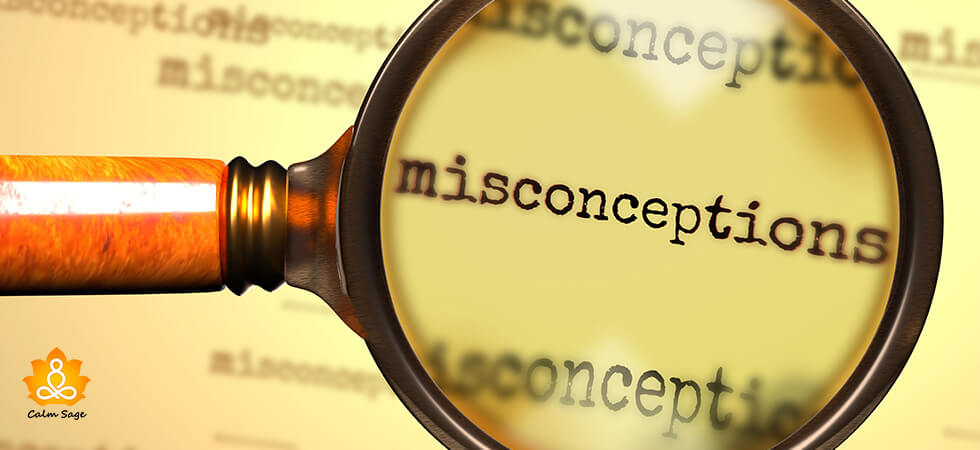Common Misconceptions About Mental Health

Mental health illnesses have always been hushed out. Only recently have we started accepting and talking about mental health. Even when mental health awareness is on the rise, there are millions who blindly believe in some misconceptions about mental health.
Mental well-being and mental illnesses have been in the shadows for so long that complete acceptance is still away from our reach. That is so because the mental health myths are so deep-rooted that uprooting them is only taking so much time.
This blog is solely to let you know all the misconceptions of mental illness that we all need to STOP believing right now! These myths and misconceptions about mental health can pollute your thoughts about mental illness and well-being.
Therefore, knowing about the misconceptions about mental illness is very important. It’s high time we stop giving in to such absurdity and believe only in the facts.
Let’s have a look at some common misconceptions about mental illnesses
Common Myths About Mental Health
1. “I can’t have a mental illness, I’m very strong”
I hate to burst your bubble but mental illness can happen to anyone. It is a complete misconception about mental health that it happens only to a certain kind of person. The probability of you developing a mental illness is equal to the probability of you developing a physical illness.
2. Mental illnesses are not real
This misconception about mental illnesses is what breaks my heart the most. Mental health issues are as real as all other physical health issues. Just because you don’t see any physical proof of a mental illness doesn’t mean it doesn’t exist. Next time you tell someone “it’s just in your mind”, think twice.
3. You develop mental illness only when you’re not raised properly
Family can be a causing factor when it comes to some mental illnesses. Having said that, parenting is not directly making anyone develop a mental health condition. Maladaptive ways of bringing a child up may play a role in a child’s mental well-being. But not all mentally ill people have bad parents. Mental illness is mainly caused by the type of experiences you’ve had in your life.
4. It’s risky to be around mentally ill people
Let’s get our facts right! It’s not dangerous to be around mentally ill people. However, there are some mental health conditions that might make a person act unreasonably only because they are insecure and scared. In fact, most mental health patients need love and support. They are not dangerous, they just need some help.
5. Mental illness is an excuse for unacceptable behavior
I have seen this myth about mental illness being used so widely. Especially in hostels, workplaces, schools, etc. A child with a mental illness is not in the right state of mind, instead of helping them you accuse them of lying, is that fair? Mental illness is real and oftentimes it’s difficult to make others understand what’s happening to them. Before calling it an excuse, try to get to the root of why someone is behaving that way.
Also listen: Podcast Ep. 8 – Common Mental Health Myths & Facts
6. Only weak people get mental illnesses
Abraham Lincoln, Virginia Woolf, Shahrukh Khan, Isaac Newton, Winston Churchill, and many more such people have suffered mental illnesses. Do you think these people are weak? Neither do mental illnesses happen to weak people nor do mental illnesses make people weak!
As I said before, mental illnesses depend on the kind of life you’ve lived. Mental health issues do not develop because of a person’s disability to cope with stressors. The coping abilities deteriorate only after one has developed a mental illness
7. Kids don’t have mental issues
Children are in fact quite vulnerable to mental health conditions. The formulation of many mental illnesses begins in childhood. The way kids are treated, the kind of parents they have, the violence that they see as a child, etc all affect a child a lot more than it may affect an adult.
Therefore, it’s quite possible for children to develop a mental health condition. We have to take kids seriously when they complain about mental health issues. They might not know what is happening but keep your eyes open to recognize the warning signs.
8. Mentally ill people can’t work
Many people hesitate in hiring people with mental illness and I can see why. People still believe that mentally ill people might not be as intelligent and incapable to carry out important duties. Will you hesitate in hiring a person with diabetes, cancer, or heart conditions? No, you might keep them away from activities that might worsen their condition.
Similarly, mentally ill people can work efficiently, all you have to do is keep them away from activities that might worsen their condition. All you have to do is keep them away from their triggers and they’ll just work fine!
That’s All Folks!
I hope you found this blog about mental health misconceptions helpful, informative, interesting, and most importantly thought-provoking. It’s high time we break the shackles these mental health myths have tied us with.
Mental health issues are as real and normal as other physical health issues. Let’s start treating both as the same. Do not believe in anything without actually reading about it. These misconceptions about mental illnesses have already ruined many lives. Let’s not add to anyone else’s misery.
Share this blog with as many people as you can so that these mental health myths are uprooted and dismissed.
Thanks for reading.
Take care and stay safe.
Also Read:
6 Best Wearable Tech Devices For Improving Mental Health




















